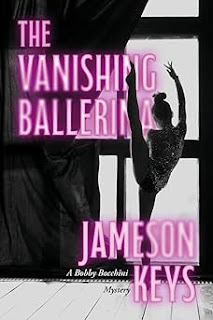https://www.amazon.com/dp/B0CSSB4C3M/
How did the character of Bobby Bocchini come to life in your mind, and what
inspired you to make him a former NYPD detective and Marine?
Bobby is an amalgamation of several much-love characters.
Some are from my childhood and some from the pages of my favorite novels, and
the silver screen. I wanted him to be an honorable and determined character,
and I think the NYPD and the Marine Corps embody many of those principles.
In The Vanishing Ballerina, Bobby grapples with
personal challenges as well as professional ones. What made you decide to
explore both his emotional journey and the mystery plot in equal measure?
Life isn’t one dimensional, and I know I enjoy characters
that are fully formed. Only in fairy tales do we run into perfect people with
perfect lives. Most of us have problems and challenges, along with our
triumphs. I wanted Bobby to ring true to life.
Can you tell us about the research process that went into
depicting the ballet world and the criminal network Bobby encounters?
I can’t say that I have expert knowledge of ballet, or organized crime, for that matter. I admire dance and especially ballet, for its grace, beauty, and innocence. In doing research for our True Crime podcast. I am all too familiar with people and organizations that seek to exploit the young and helpless. I wanted there to be a stark contrast in the book. Good vs evil, light vs darkness. I even tried to carry that theme into the design of the cover art.
Bobby's old boss, Sal Mancuso, plays a significant role
in the story. What influenced your decision to include a strong connection to
his past?
I have been fortunate enough to have many mentors along the
way. I wanted Sal to be an ohmage to all those older and wiser people that have
helped me.
The backdrop of 9/11 is a pivotal part of Bobby's
backstory. How did you approach integrating this sensitive historical event
into a fictional narrative?
While the story takes place years after 9/11. The day
remains pivotal in the city’s history. Bobby’s rise from his injuries, his doubt,
and his circumstances remind me of what the city and the country went through
since that fateful day in 2001.
The theme of unresolved cases is central to the novel.
What intrigued you about this theme, and why was it important to include it in
Bobby's story?
My daughter and I have a true crime podcast called “what We Lose
in the Shadows.” Although we deal with a variety of true crime cases. One of
the recurring themes is just how many cases are forgotten and left unsolved.
For the victims' sake, we try to keep many of those cases alive and keep people
thinking about them. Because you just never know, you may have that one key bit
of information that brings the case home.
Bobby's physical limitations due to his past injuries add
a unique aspect to his character. How did this element shape the development of
the plot and his character?
I appreciate unique characters. It would be easy to make him
a Superman of sorts, but I wasn’t going for that. I wanted him to be a
combination of strength and vulnerability, conviction, and doubt. A realistic
sketch of someone very much like us.
Romance plays a role in Bobby's journey throughout the
book. What was your intention behind introducing a love interest amidst the
central mystery?
Life is often portrayed as this beautiful symphony of
perfectly aligned events. Though it is more often a complicated, messy
cacophony of seemingly random connections. Since Bobby is embroiled in not one
but two challenging cases. Naturally, that would be the precise moment romance
would choose to enter the picture.
The book's title, The Vanishing Ballerina, is
quite evocative. How did you land on this title, and what significance does it
hold in relation to the story?
I used to watch a television show called “Without A Trace.” One
feature during the plot set up was that the missing character would simply
vanish from the screen. I always liked that effect. I was wrestling with the
title. Then I broke it down into its most basic relatable form. This beautiful,
bright young girl simply disappears in a city of eight million people. She
simply vanished.
Finally, without giving away any spoilers, can you share
a bit about how you developed the book's climax, balancing the resolution of
the mystery with Bobby's personal growth?
Bobby struggles throughout the book, wondering if he can do
this? Given his limitation, does He still have what it takes to see it through?
And if he does, at what cost? I used storyboards throughout the book's
development. Once I knew where I wanted the story to land. It was just a matter
of getting there in a satisfying and hopefully entertaining way.

